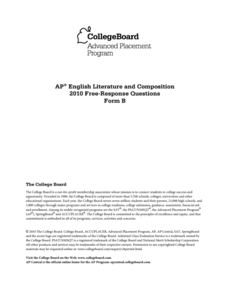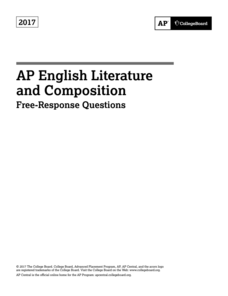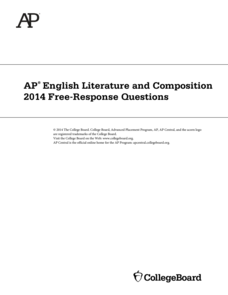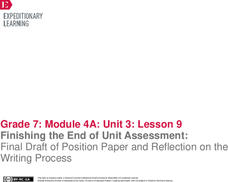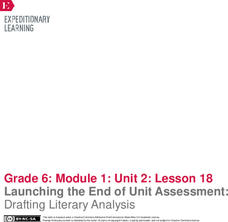Newseum
Slanted Facts and Slippery Numbers
The Internet is known as the information superhighway, but sometimes it's hard to know when to hit the brakes on unreliable sources. Using a well-rounded lesson plan, pupils read and summarize articles about the gender pay gap and...
College Board
2007 AP® English Language and Composition Free-Response Questions Form B
Do museums offer eyes into the past? Scholars synthesize sources to make a claim in an essay about the importance each museum artifact deserves. Pupils also write to analyze journalist level of ethics as well as a speech by Wendell...
College Board
2006 AP® English Literature and Composition Free-Response Questions Form B
It is not about where you are going, but the journey to get there. Scholars choose a play or novel in which a character takes a journey. They then create essays describing what the journey meant to the overall piece of work. Learners...
College Board
2008 AP® English Literature and Composition Free-Response Questions Form B
Ever wondered what your dog is thinking? Scholars take a close look at two poems written through the eyes of animals and then create essays analyzing each author's technique. Pupils also read a passage to write about the literary...
College Board
2010 AP® English Literature and Composition Free-Response Questions Form B
Home is where the heart is. The 2010 AP® English Literature and Composition Free-Response Questions Form B require scholars to think about what home really is. They look at how a character leaves home, yet home remains within the...
College Board
2011 AP® English Literature and Composition Free-Response Questions Form B
It's all in the technique. Authors use many techniques to express themselves using writing. Two of the three essay questions require scholars to analyze the literary devices used by the authors and write essays about how these techniques...
College Board
2006 AP® English Literature and Composition Free-Response Questions
Scholars select a novel or play and then craft an essay that describes the setting's role in the story. Pupils also create essays that analyze a poet's use of language and the values of characters in a novel excerpt.
College Board
2007 AP® English Literature and Composition Free-Response Questions
Scholars use the 2007 AP® English Literature and Composition Free-Response Questions to write essays examining how a character's tie to the past affects the story. The resource also requires pupils to write essays comparing two related...
College Board
2008 AP® English Literature and Composition Free-Response Questions
Scholars are challenged to create essays comparing two poems in which the authors discuss fears and concerns about dying and life passing by too quickly. Two other essay questions ask writers to analyze literary elements and characters...
College Board
2002 AP® English Language and Composition Free-Response Questions
It is not what you say but how you say it. Scholars use an essay prompt from the 2002 AP® English Language and Composition Free-Response Questions to analyze how an author uses language to describe her past. They also support or argue a...
College Board
2003 AP® English Language and Composition Free-Response Questions Form B
You took the words right out of my mouth! One question in 2003 AP® English Language and Composition Free-Response Questions Form B allows scholars to develop opinions on pupils receiving zeros for plagiarism. Other essays analyze ideas...
College Board
2002 AP® English Language and Composition Free-Response Questions Form B
"Don't go forth today." Why would Caesar's wife not persuade him to stay home? Scholars read an excerpt from the play Julius Caesar and write essays on why Caesar listened to Decius rather than his wife. Pupils then write two more essays...
College Board
2017 AP® English Literature and Composition Free-Response Questions
Music brings back a memory. One prompt from the 2017 AP® English Literature and Composition Free-Response Questions asks scholars to read a poem and write essays analyzing the relationship between music and the author's memories. Two...
College Board
2016 AP® English Literature and Composition Free-Response Questions
Have you ever met a wolf in disguise? The last essay question in the 2016 AP® English Literature and Composition Free-Response exam asks writers to think of deceitful characters and create essays describing why they carried out...
College Board
2015 AP® English Literature and Composition Free-Response Questions
It is a cruel world. Scholars create essays about a piece of work that describes what cruelty reveals about a character. A prompt from the 2015 AP® English Literature and Composition Free-Response Questions also contains two other essay...
College Board
2014 AP® English Literature and Composition Free-Response Questions
How much would you give up for others? The last prompt in 2014 AP® English Literature and Composition Free-Response Questions asks scholars to write essays about a character in a piece of work that has sacrificed and what the sacrifice...
College Board
2005 AP® English Language and Composition Free-Response Questions
Should people only have what they need? Questions from the 2005 AP® English Language and Composition Free-Response section asks scholars to write essays evaluating the argument that those who are more fortunate should give all excess...
College Board
2004 AP® English Language and Composition Free-Response Questions
Shall we agree to disagree? Scholars have the opportunity to choose a topic they feel is controversial in the world and express ideas about it. They complete essays that address the opposite views. In two other essays, they analyze a...
EngageNY
Researching Miné Okubo: Gathering Textual Evidence
Scholars read two texts about Miné Okubo’s life. In Riverside’s Miné Okubo and Miné Okubo, readers gather information to write narrative essays describing how Okubo became visible again. The essay serves as part of a performance task.
Literacy Design Collaborative
Existentialism and Kafka
Scholars read Kafka's The Metamorphosis and research for essays and articles on existentialism. After gaining information and evidence from their research, pupils write essays defining existentialism and its relationship on the work of...
EngageNY
End of Unit 2 Assessment, Part 1b: Writing Introduction and Conclusion
Writers continue looking at the rubric for their A Long Walk to Water essays. This time, they analyze the demands for the introduction and conclusion paragraphs. Pupils compare the rubric to the opening and closing of the model essay,...
EngageNY
End of Unit Assessment, Part 1, Continued: Revising Vocabulary and Conventions Based on Feedback
Writers align their position papers with the last two rows in the rubric. After looking at the rubric rows for vocabulary and conventions along with feedback on their papers, class members revise their essays. They then look at the...
EngageNY
Finishing the End of Unit Assessment: Final Draft of Position Paper and Reflection on the Writing Process
Think about it. Writers think about their end of unit essays through reflection. They use the End of Unit 3 Assessment, Part 2: Reflection on the Writing Process handout to analyze the writing process they used to create their position...
EngageNY
Launching the End of Unit Assessment: Drafting Literary Analysis
Is there a connection? Scholars work to write a summary and theme to connect The Lightning Thief and myth of Cronus. They begin by looking at a model essay and then work on their own drafts.
Other popular searches
- Essay Writing
- Compare and Contrast Essay
- Five Paragraph Essay
- Expository Essays
- Descriptive Essay Writing
- Essay on Children's Day
- Argumentative Essay Writing
- Compare & Contrast Essays
- Descriptive Essay
- Cause and Effect Essay
- Narrative Essays
- Five Paragraph Essay Writing






